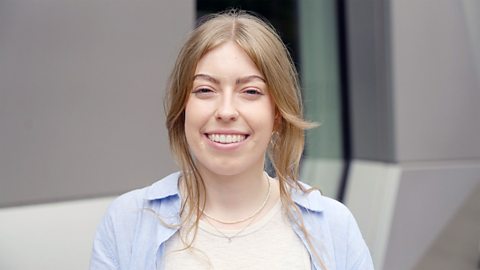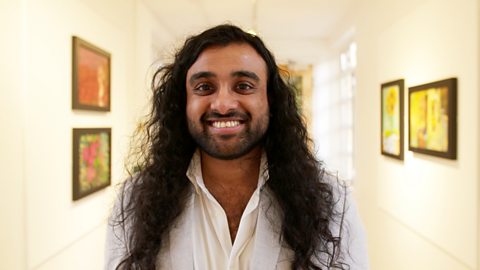Meet Shiza, 24, a counsellor working for a charity in London. Find out more about her job and the route she took to get there.
Part of our Bitesize world of work series.
I support people to make positive changes in their lives.
Shiza:
Hi, I'm Shiza and I am a counsellor. I support people in making a positive change in their lives.
A counsellor supports someone who is experiencing emotional and psychological difficulties. These could be anxiety, depression, PTSD, relationship issues.
A typical day for me is basically meeting with regular clients. Working remotely is a huge part of what I do. It's easier for me as well as for my clients. It will make it easy for them to find a safe space in their home so that they feel comfortable and share what they need to.
Being non-judgmental is also a huge part of being a counsellor because if judgment does come between a therapy room it does provide a huge barrier for the client to move forward. Empathy is what's taught from day one. It's basically putting yourself in the client's shoes, understanding what they feel.
Making notes is a huge part of what I do and these notes are also very confidential. It is important that you do summarise these notes and shred anything that you need to.
When I was in school we were looking at different careers, we were looking at doing out GCSEs. Around about the same time my friend was going through something very difficult in her home life and I wanted to be the one to support her for that.
So after finishing my GCSEs, I did A-levels in Sociology and Psychology. English is a huge part of my career, understanding what the client is saying, basically rephrasing and paraphrasing what they're telling you, to help the client understand what they're going through.
Humanities and religious studies is also important because humanity gives you a good understanding of general knowledge and religious study gives you an idea of different religions. When I am facing with a client that has a different religion I do have a bit of knowledge.
Ann-Marie, employer:
Shiza takes the time to learn about her clients, find out what their needs are and is really good at discussing with me what other needs she feels that her clients have so that we can find the best solutions for them. Her clients can rely on her to show up at the times that they've agreed and she is reliable for us because we know that she is carrying out her role effectively.
Shiza:
There is a huge progression in being a counsellor, you can start off from volunteering and going on to, sort of, counselling roles and then from there you can on to managerial roles.
So the tips for a young person who wants to become a counsellor would be basically to do your research. Knowing that I had a part to play in a breakthrough moment, that is a just an amazing feeling.
- A big part of Shiza's job as a counsellor is speaking with people who are experiencing a wide range of emotional and psychological difficulties.
- She helps her clients discuss their problems and feelings, so confidentiality is very important when dealing with sensitive and personal information.
- The main skills and attributes Shiza uses include empathy, organisation, self motivation, and being non-judgemental.
- Studying English at school helps her communicate appropriately with clients and to summarise notes. She uses Maths to manage her time and understand statistics. Religious Studies helps her understand the needs of clients with different religions and beliefs.
- Shiza took A-levels in Psychology, Sociology, and Art.
- She then completed a degree in Psychology and a further masters degree in Integrative Counselling and Psychotherapy, which she studied online during the Covid-19 pandemic.
- After graduating, Shiza began volunteering before getting a job as a counsellor. She loves meeting new clients and helping them on their journey.

Top tips
- Research different organisations. See what opportunities are available. There are many different routes into counselling.
- Look after yourself. The journey to becoming a counsellor can be difficult and emotional, remember to take a break and check in with yourself.
- Get experience by volunteering. Understand what counselling can do to support people and the challenges involved in the job.

What to expect if you want to be a counsellor
- Counsellor average salary: NHS bands 5-7. Read more about NHS bands. Salaries will differ in private healthcare.
- Counsellor typical working hours: 37 to 40 hours per week.
What qualifications do you need to be a counsellor?
You could get into this role via a university course, a college course, an apprenticeship, or training with a counselling organisation.
Sources: LMI for All, National Careers Service.
This information is a guide and is constantly changing. Please check the National Careers Service website and the NHS Health Careers website for the latest information and all the qualifications needed.
For careers advice in all parts of the UK visit: National Careers Service (England), nidirect (Northern Ireland), My World of Work (Scotland) and Careers Wales (Wales).

Omar: social worker. video
Omar is a social worker working with children and families for a local authority.

Poppy: public health officer. video
Poppy is a public health official for a local authority in London.

Hari: trainee clinical psychologist. video
Hari is a trainee clinical psychologist working in a community mental health team.
